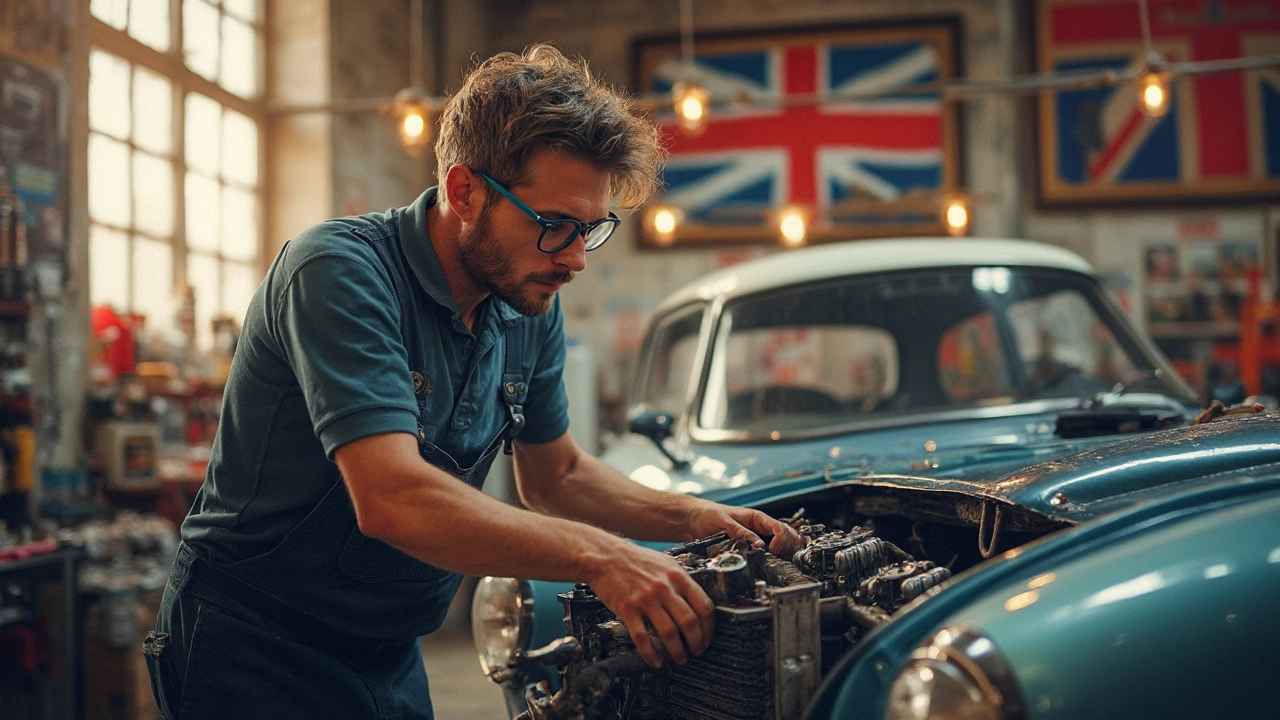So you've noticed your car's temperature gauge going into the red more often than not. That's never a comforting sight. You might be wondering if it's time to swap out your radiator. After all, a healthy car radiator is a staple for keeping your engine cool and your car running smoothly.
Radiators play a massive role in the cooling system, ensuring your engine doesn’t overheat by transferring heat away. But how do you know when it’s really time to pull the trigger on a replacement? It's a big decision, right? Let's break it down.
Look for signs like frequent overheating, odd noises from the radiator, or coolant leaks. They’re not just annoying; they could hint that your radiator is on its last legs. And trust me, dealing with a failed radiator in the middle of nowhere is no fun.
- Purpose of a Car Radiator
- Signs You Need a Replacement
- Cost vs. Benefit
- DIY vs. Professional Installation
- Maintenance Tips
- Making the Decision
Purpose of a Car Radiator
Ever wondered why your car doesn’t just burst into flames every time you drive? That’s because of the unsung hero called the car radiator. It's a key player in the car's cooling system, quietly ensuring your engine keeps its cool.
Now, the primary job of a radiator is to dissipate heat away from the engine. It works by cycling coolant through engine channels to absorb heat, which then moves to the radiator. Once there, the air passing through the radiator grille helps cool the liquid before it heads back for another heat-absorbing round.
Why Is This Important?
An overheating engine can lead to catastrophic damage. Think of blown head gaskets, warped pistons, or in worst cases, a full engine meltdown. So yeah, the radiator might just be one of those things that keep your ride from turning into a barbecue grill.
Heat Exchange: The Science Bit
Okay, here's how it actually pulls off this ingenious trick. The radiator exchanges, or dissipates, heat using the principle of thermal conduction. Inside, you've got these neat metallic tubes filled with coolant. When the hot coolant enters the radiator, it spreads heat across fins, which are excellent at allowing the heat to escape into the surrounding air.
Radiator Construction
Most car radiators are made of aluminum, which is lightweight and effective for heat conduction. Usually, they're a combination of plastic and aluminum, which strikes a balance between cost and efficiency. Older models might use copper and brass, which were heavier but also effective in terms of heat exchange.
So, next time you pop the hood and see that big, sometimes buzzing hunk of metal in front of the engine, you'll know just how much work it’s putting in to save your day, every single drive.
Signs You Need a Replacement
Recognizing when your car radiator needs replacing isn't rocket science, but it does require paying attention to a few telltale signs. If you detect any of these symptoms, it might be time to swap out the old radiator for a new one.
1. Constant Overheating
Overheating isn't just your car's way of saying it’s hot outside. It's a major sign that your cooling system isn't effectively directing heat away from the engine. Regular overheating could spell doom for your engine if left unchecked, and your radiator might be failing to do its job.
2. Coolant Leaks
Notice puddles under your car that aren't just water? That's probably coolant escaping. Leaks are a clear sign you’ve got a problem. If your car is dripping coolant, especially in spots you park, and you're topping off the coolant too often, your radiator could be the culprit.
3. Discolored or Rusty Coolant
The coolant should be a nice, consistent color. If it looks rusty, or there's floating debris, it’s not filtering properly through your radiator. Old, corroded radiators may leak contaminants into the coolant, indicating you might need a replacement.
4. Sludge Build-up
When coolant mixes with contaminants, it turns into sludge, a kind of gunk you don't want in there. It clogs the radiator, causing inefficiency in cooling. This gunk buildup suggests it's time to consider a radiator replacement to keep your engine's temperature in check.
5. Frequent Refilling
If you find yourself frequently refilling your coolant, despite not seeing any leaks, your radiator may be on its last legs. This hints at an internal crack or a blocked passage in the cooling system.
Engine overheating stats show that nearly 20% of roadside assistance calls in the summer months are related to cooling system failures. A failing radiator is often a main cause, highlighting the importance of addressing these signs early.
Cost vs. Benefit
Deciding whether to replace your car radiator can feel like a tough call. It's not just about the upfront cost but the long-term benefits, too. Let's dig into what this really means for your wallet and your car's health.
Understanding the Costs
First off, the price tag for a new radiator can vary quite a bit. If you choose an OEM (Original Equipment Manufacturer) part, you're looking at something between $200 and $400. Aftermarket options are generally cheaper, sometimes coming in under $150. But don't forget labor costs, which can be another $100 to $400 depending on your car model and the mechanic you choose.
And that’s if you’re going the professional route. If you're handy with tools, doing it yourself can save a chunk of change. But keep in mind, it's not a simple task, and a mistake could cost you much more in engine repairs down the line.
Weighing the Benefits
On the benefits side, a new radiator does wonders for your cooling system. Imagine not having to worry about overheating when you're stuck in traffic or on a long drive. That's peace of mind worth considering.
Plus, a functional radiator ensures your engine runs efficiently. This not only prolongs the engine’s life but can also give a little boost to your fuel economy. In the long run, these factors can save you from costly repairs or even a dreaded engine replacement.
One more thing: regularly replacing worn parts like the radiator can sustain or even increase your car's resale value. In the used car market, maintenance records showing a well-kept cooling system can give you an edge.
Quick Benefit Table
| Aspect | Cost (Range) | Benefit |
|---|---|---|
| New Radiator | $150 - $400+ | Ensures efficient cooling, promotes fuel economy |
| Labor | $100 - $400 | Professional installation guarantees reliability |
It’s all about balancing the costs and rewards. Know what your car needs and make the decision that best fits both your current situation and future plans.

DIY vs. Professional Installation
So, you're standing at the crossroads of whether to tackle the radiator replacement yourself or to call in the pros. Let’s face it, both options come with their own set of pros and cons. Let’s break them down.
DIY Replacement
Going the DIY route can be rewarding, and it’s no secret that doing it yourself is often cheaper. If you're mechanically inclined and have the right tools, you could save a chunk of change by taking matters into your own hands. Many folks enjoy the satisfaction of fixing their own car.
Here's a quick glance at what you might need to consider as a DIYer:
- A quality toolkit, including wrenches of various sizes and screwdrivers.
- Knowledge of the cooling system and confidence in handling car parts.
- Adequate time, because rushing usually leads to mistakes.
It’s important to remember, as automotive expert Mike Allen puts it,
"Undertaking radiator replacement DIY isn't just about saving cash, but also involves understanding the risks and having a good set of skills."
Professional Installation
On the flip side, letting the pros handle it could save you from a potential headache if things go wrong. Mechanics bring expertise and have all the necessary tools to get the job done right. Plus, most shops offer a warranty, which gives you peace of mind.
When you consider professional work:
- You're paying for expertise and convenience.
- You avoid the risk of any errors that could lead to bigger issues.
- Time isn’t an issue – it’s theirs, not yours.
Here's a quick look at average costs to replace car radiators professionally, bearing in mind prices can vary by location and car model:
| Service Type | Estimated Cost |
|---|---|
| Parts Only | $100 - $300 |
| Parts & Labor | $300 - $800 |
At the end of the day, whether you choose DIY or professional installation, it boils down to your comfort level, the time you have on your hands, and the value you place on a warranty. Make the choice that best suits your personal situation and skills.
Maintenance Tips
Keeping your car radiator in tip-top shape is key to avoiding costly replacements. Thankfully, it doesn't require rocket science. Here’s how you can extend the life of your radiator with some regular upkeep.
Check Coolant Levels Regularly
First up, always keep an eye on your coolant levels. Low coolant can cause your engine to overheat, a one-way ticket to damage city. Make sure to check these levels every couple of weeks—or even more often if you're in the habit of driving long distances.
Inspect for Leaks
Fluid spots in your parking space could mean your radiator's sprung a leak. It's worth taking a couple of minutes to inspect for leaks every now and then. Catching them early can save you from a future headache.
Keep It Clean
Dirt and debris can clog your radiator, causing it to work harder than it needs to. Usually just a hose down at the car wash can help, but check your car manual for any specifics. Make sure your radiator fins are not bent and allow for a good airflow.
Flush the Radiator
A radiator flush is like a spa day for your cooling system. Over time, coolant can degrade and accumulate impurities. Flushing it out every couple of years will help keep the system clean. If you're not sure how to do it, a mechanic could sort it out without too much damage to your wallet.
Check the Radiator Cap
The radiator cap might be easy to overlook, but it's crucial for maintaining pressure in the cooling system. A loose or damaged cap could lead to overheating. Make sure it seals tightly to keep things running smoothly.
Consider Using a Radiator Conditioner
Conditioners can help protect against rust and seal minor leaks. While not a cure-all, they're a handy addition to your maintenance toolkit. Always read your car’s manual to ensure compatibility.
Stick to these tips, and you'll be doing your part to prevent that dreaded engine overheat situation. Plus, a well-maintained radiator supports your car's overall performance. Who wouldn't want that?
Making the Decision
By now, you've probably weighed the pros and cons of swapping out your car radiator. But how do you finally decide whether to go for it or not? Well, it mainly comes down to a few factors like cost, condition, and future plans for your vehicle.
Assessing the Condition
First things first, how bad is it, really? If it's just a small coolant leak or some minor rust, a repair might buy you some more time. But if your radiator's basically a rusty sieve or overheating is a regular party trick, that's a clear sign for a replacement.
Considering Costs
Money talks, right? You should look at how much a replacement will set you back compared to the cost of frequent repairs. On average, a new radiator replacement can cost between $200 to $900, depending on the make and model of your car. Labour might push this higher, especially if you're not taking the DIY route.
Future Plans
Think about what you're planning for your car long-term. If you're going to keep it for a while, investing in a new radiator could save you from frequent breakdowns. But, if you're planning to upgrade soon or the car's on its last legs overall, you might want to stick with quick fixes.
Game-Changer in Engine Overheating
Let’s not forget why we're here—to prevent that dreaded engine overheating. A solid, functioning radiator is your engine’s best friend. Skimping on replacement might mean dealing with costlier damage down the road. The last thing you want is being stranded with steam coming out from under the hood!
| Factor | Impact |
|---|---|
| Condition of Radiator | Major issue? |
| Replacement Cost | $200-$900 |
| Long-term Plans | Keep or upgrade? |
Making the decision might not be a walk in the park, but considering these factors will point you in the right direction. Trust your gut once you’ve got all the facts lined up.

